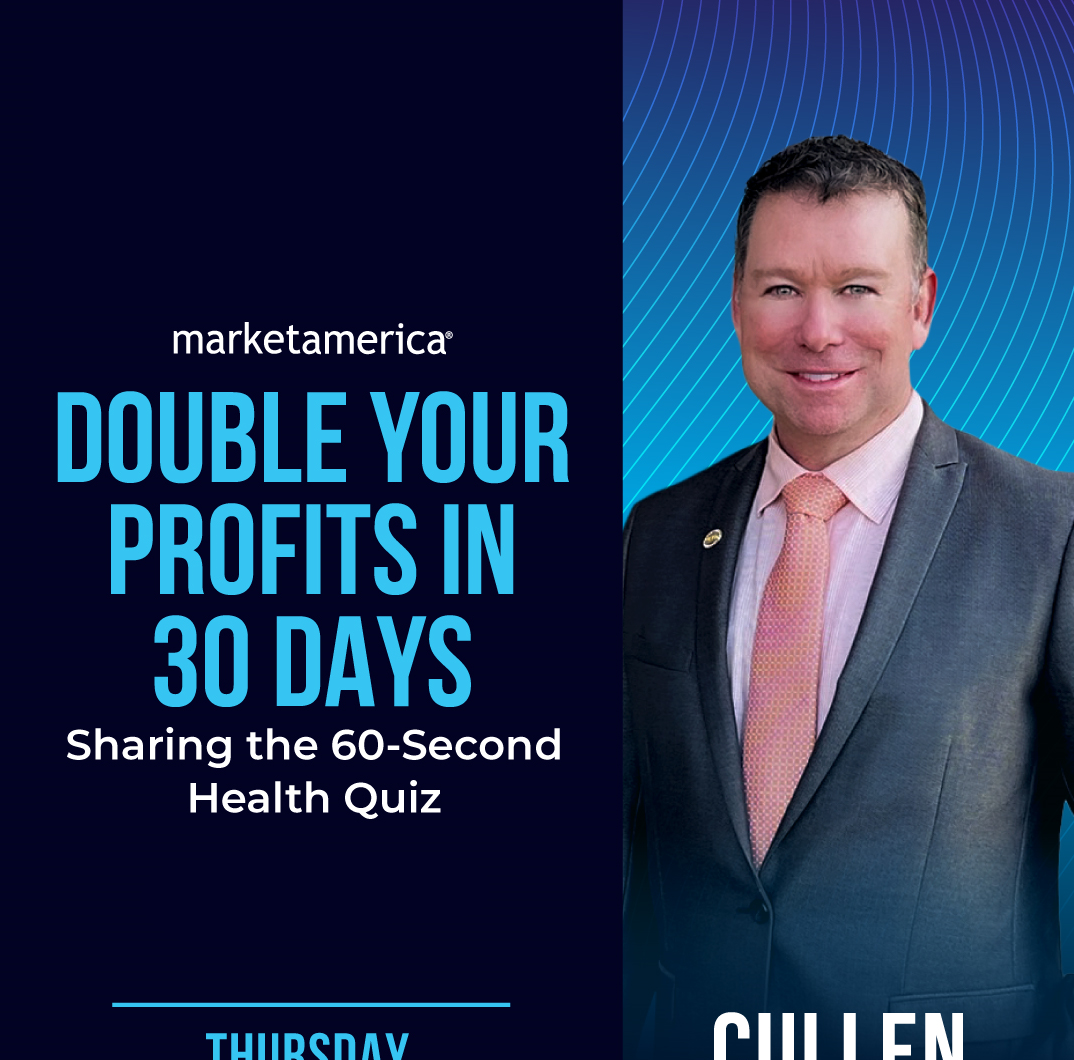
Recent Articles

By Brett Kesler
•
March 7, 2025
The excitement from Market America Worldwide | SHOP.COM’s 2025 Leadership School is still buzzing! If you missed it or want to relive the most impactful moments, we have great news for you. Join us for an exclusive Zoom session on Wednesday, March 12, at 9:00 p.m. ET , where corporate leaders will break down everything you need to know from this transformative event. Why You Can’t Miss This Recap Get ready for an inside look at the biggest highlights from Leadership School, including: . ✅ New Product & Technology Launches Be among the first to discover the latest innovations designed to boost your business. Exciting new products from top brands like Isotonix®, GoTrim®, Prime™, Motives®, and Layered™ will be unveiled, alongside game-changing website enhancements. ✅ Proven Business-Building Strategies Learn expert techniques to maximize growth and efficiency, including cutting-edge social media strategies and time-management tools that can elevate your success. ✅ Industry-Shaping Opportunities Gain insights that will help you stay ahead in today’s fast-paced marketplace. Understand the trends and shifts that could give you a competitive edge. Stay Informed, Stay Inspired . As Co-Founder Loren Ridinger reminds us, “Market America isn’t just a company — it’s a catalyst for change.” Whether you attended Leadership School or not, this session ensures you’re fully equipped with the knowledge and motivation to capitalize on new opportunities. Reserve Your Spot Now! Don’t miss this chance to connect with leadership, gain invaluable insights, and fuel your success for 2025. Mark your calendar for March 12 and get ready to take your business to the next level!

Loren Ridinger on The Skinny Confidential Him & Her Podcast: Love, Loss, and Turning Pain Into Power
By Brett Kesler
•
March 7, 2025
In a powerful and deeply personal episode of The Skinny Confidential Him & Her Podcast, Loren Ridinger opens up about love, loss, and the resilience required to turn pain into power. Hosted by Lauryn and Michael Bosstick, this conversation dives into Loren’s journey of navigating life after the passing of her husband, JR Ridinger, and how she has transformed grief into a driving force for success. Embracing Strength Through Adversity Loren shares an intimate look at how she rebuilt her life, both personally and professionally, after facing immense loss. She discusses the mindset shifts that helped her not only heal but also propel forward in building a multi-million-dollar empire. Her story is a testament to the power of resilience, inner strength, and an abundant mindset. Success, Growth, and the Power of Mindset Beyond personal challenges, Loren also opens up about what it takes to achieve lasting success. From the habits that drive her daily routine to the lessons she’s learned as a businesswoman, she offers invaluable insights for anyone looking to elevate their life and career. If you're seeking inspiration, motivation, or simply a raw and honest conversation about love and life, this episode is a must-listen. 🎧 Listen now: Apple Podcasts 📺 Watch on YouTube: Loren Ridinger on The Skinny Confidential Don’t forget to follow @tscpodcast, @laurynbosstick & @michaelbosstick for more inspiring conversations!

By Brett Kesler
•
March 5, 2025
The Market America Worldwide | SHOP.COM 2025 Leadership School (#MALS2025) was one for the books! We want to extend our gratitude to everyone who made this event so special. It was a powerful weekend filled with inspiration, motivation, and game-changing strategies to help you take your UnFranchise® Business to the next level. But that’s not all! We also unveiled an incredible lineup of innovative new products designed to elevate your health, beauty, and lifestyle. Let’s dive into some of the hottest new releases you don’t want to miss! H2TAB Molecular Hydrogen Tablets

By Brett Kesler
•
March 4, 2025
Wow—what an unforgettable experience! The 2025 Leadership School was nothing short of spectacular, and we’re still buzzing from the energy, excitement, and inspiration. A massive thank you to all the passionate UnFranchise® Owners who showed up ready to learn, grow, and take their businesses to the next level. Your dedication is what makes this company thrive, and together, we’re reaching new heights! Relive the Magic If you weren’t able to attend (or just want to relive the excitement), be sure to check out the official highlight video. It’s just a glimpse of the powerful moments, game-changing insights, and unforgettable experiences from this year’s event. The Momentum is Just Beginning! Leadership School may be over, but the journey is just getting started! Over the next week, keep an eye on your inbox for exclusive updates, exciting launches, and powerful innovations designed to accelerate your success. Stay engaged, share the news, and most importantly— take action to keep the momentum going! Next Stop: The 2025 International Convention If Leadership School left you feeling inspired, just wait until Market America Worldwide | SHOP.COM 2025 International Convention ! This is the biggest event of the year , and tickets are selling out FAST. Don’t miss this opportunity to connect, learn, and be part of something truly transformational. Get Tickets Let’s keep the energy high and make 2025 a year to remember! 🚀🔥

By Brett Kesler
•
March 1, 2025
Are you ready to take your business to the next level? Our brand-new 60-Second Health Quiz is designed to engage, educate, and drive results—helping you boost your profits in just 30 days! Join Cullen Haskins on March 6 at 9:00 P.M. ET for an exclusive step-by-step training on how to leverage this powerful tool for maximum impact. Learn how to turn quick insights into meaningful connections and revenue growth. 📅 Event Details: . 📍 Topic: Leveraging the 60-Second Health Quiz for Business Growth 🎤 Featured Speaker: Cullen Haskins ⏰ Date & Time: March 6 at 9:00 P.M. ET Don't miss out on this game-changing opportunity! 👉 Register Now and start unlocking retail profits today!

By Brett Kesler
•
March 1, 2025
Looking for a quick and easy way to improve your health? With the 60-Second Health Quiz , you can discover personalized product recommendations that are tailored specifically to your needs, all in just one minute! It’s fast, simple, and designed to give you the best products for your health journey. Here's what you can expect from the Health Quiz: Personalized Recommendations : Receive up to 6 product suggestions customized for you. Detailed Information : Get all the details, plus videos, on each recommended product so you can make an informed decision. Exclusive Discount : Enjoy 10% off your next purchase on Market America's products through your SHOP.COM site! How to Share the 60-Second Health Quiz Sharing the Health Quiz is easy! If you’re an UnFranchise® Business owner, follow these simple steps to share the quiz and help others discover their health potential: Share Your Link Click the button below to copy your personal link to the quiz. Then, share it via text message, email, social media—whatever works best for you. Use the UnFranchise Marketing App Download the UnFranchise Marketing App (if you haven’t yet), open the app, and navigate to the Health Quiz carousel. Select the asset you’d like to share, tap the share button, and send it through your preferred platform. Track Your Progress The app also tracks progress and notifies you when someone takes action on the assets you’ve shared. This feature helps you stay on top of your outreach efforts. With the 60-Second Health Quiz , it’s never been easier to find the right health solutions and share them with your network. Take just one minute and change your health today!












